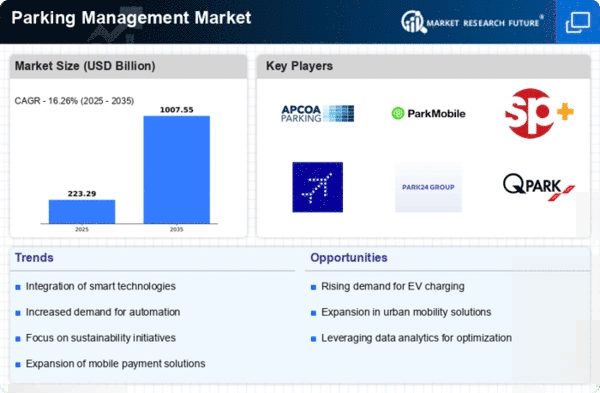Market Share
Parking Management Market Share Analysis
Several major trends in the parking management market indicate how it is changing to become more efficient and sustainable regarding parking issues due to significant changes occurring in urban mobility today. One of these is the increased use of smart parking technologies. To cope with limited space for vehicles and the increased number of cars on roads, cities should adopt smart parking management systems. Mobile apps are now being integrated with Parking Management. Parking information is available through mobile apps such as paying for parking or booking a slot. The latter allows drivers to locate available spaces electronically, thus lessening car circling time while contributing toward environmental conservationism by reducing car emissions around urban areas. For instance, mobile applications can offer additional features such as real-time parking availability updates or navigation instructions to reach particular spots where one's vehicle would be safe during their absence. The rise of such technology characterizes Parking Management trends in use of contactless and cashless payment systems. Parking facilities have turned to digital payments such as mobile wallets, contactless cards, or app-based payments to increase safety and hygiene. In addition, the incorporation of license plate recognition (LPR) technology has emerged as one of the major trends in the Parking Management industry. LPR system facilitates the identification of vehicles entering and leaving parking lots automatically without using physical tickets or access cards. The trend for smart cities has affected Parking Management concepts with more focus on creating connected and sustainable urban places. Therefore, parking solutions seek to play a role within broader smart city programs by incorporating data analysis that uses predictive models to optimize traffic management, thus reducing emissions while enhancing urban mobility generally. The employment of AI algorithms and data analytics in Parking Management is leading to greater efficiency within these systems. Thus, they enable the prediction of parking patterns, optimization of pricing strategies, and overall improvement of how parking facilities are managed. This leads us to the next point. The popularity of green modes of transportation is also changing how we approach Parking Management issues. For instance, dedicated parking areas fitted with charging stations serve as incentives for electric vehicle (EV) adoption by cities and businesses at large amid calls for sustainability during transport services provision. Automated parking solutions have been developed due to challenges posed by rapid urbanization and population density growth rates. By integrating robotics and automation into them, automated parking systems can park numerous vehicles quickly in limited spaces.



















Leave a Comment